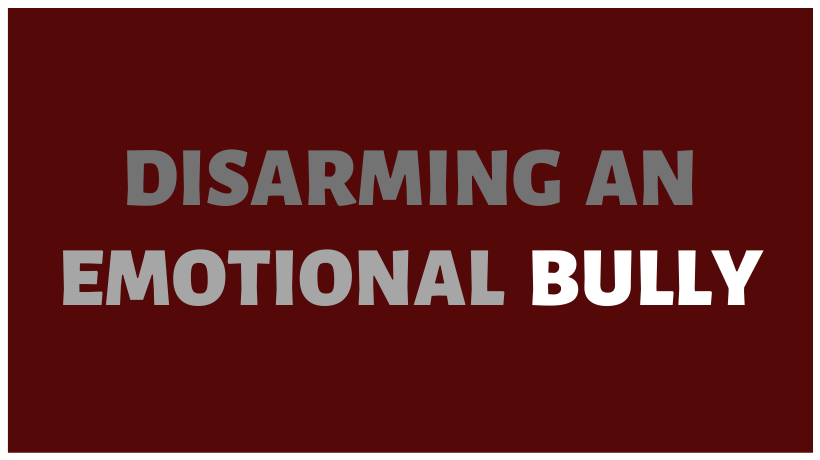Bullying isn’t just for the playground. Consider the bullying behavior at work or adults who use emotional power tactics to dominate their peers.
We all have hidden vulnerabilities, and a common fear is social rejection. This hidden fear can be what emotional bullies use to generate shame in others. Since bullies are insecure, they try to displace their feelings of guilt onto peers and subordinates.
Research by educator and emotional consultant Joanna Nicola reveals that bullies use one method to make others feel bad – taking advantage of others’ fear of social rejection by zeroing in on specific kinds of deficiencies. Many of us feel the urge to apologize for things that others know there is no shame in. Knowing the target areas will give you the power to disarm any bully from taking advantage of you when they try to make you feel bad about yourself.
While we may feel the need to apologize for actual behaviors that cause others grief or harm such as forgetting a birthday or anniversary, making a careless but hurtful remark, or not following through on a promise, you will find that none of the qualities that the bully tries to make you feel ashamed of fit in the category of shameful behavior. It is this crucial flaw in the bully’s attempt to make you feel bad that will allow you to stop the abuse. The technique below, called the Nicola Method, lets you direct the bully’s attention to the flaw in their claim that you should feel ashamed. The method works without the bully realizing it was you who did it. Here are three steps that, if followed and practiced as described, will disarm the emotional bully:
Step 1: Identify the type of deficiency the bully is using to trigger you to feel shame.
Here are four common deficiencies that spark social fears in the workplace:
- Not being intelligent enough
- Not being competent enough
- Not being socially skilled enough
- Not being courageous enough
Here’s an example.
Bully: What the hell were you thinking when you made that suggestion? You don’t have enough experience to open your mouth. This remark is in the domain of “not being competent enough.”
Step Two: Use the same nonconfrontational phrase every time. Memorize this: “It seems like you think I should feel ashamed for…”
This step allows you to convince the bully to explain why you should be feeling ashamed. If you can momentarily lead the bully to believe that you think they might be right, they will be happy to do as you suggest.
Step Three: Complete the phrase with the social fear the bully is trying to trigger. Do this by adding the name of the quality the bully thinks you lack.
In our example, you’d finish the phrase It seems like you think I should feel ashamed for… with not being competent enough. You are adding on the deficiency that fits best according to the attack. It could be “not being intelligent enough,” “not being socially skilled enough,” “not being courageous enough,“ etc. In this way, you casually suggest that the emotional bully explains in more detail why you should feel ashamed.
It is important that you use exact language because it will work to lull the bully into believing that you want to face your shame. It works because in the bully’s mind, your acceptance of shame represents a delivery of relief from uncomfortable feelings. However, because the bully’s belief is flawed about your “shameful” behavior when they try to explain to you why you should feel ashamed, they will find themselves stuck without an explanation.
Your next response in the conversation will usually end the attempt to make you feel ashamed, and the bully will find an exit out of the conversation. With our example, here is how it might go:
Bully: I’d sure feel embarrassed if I didn’t know what I was doing!
Response: What would you feel embarrassed about?
The bully’s next response will likely be one of these:
- Oh, forget it. Can’t you take a joke?
- I’m not going to talk about this with you.
- Just drop it. I’m tired of this conversation.
Let’s try another example using the social fear of not enough courage:
Bully: You are such a wimp. Why can’t you step up for once?
Response: It seems like you think I should feel ashamed for not being courageous enough.
Bully: That’s right. You should feel ashamed!
Response: Why should not being courageous make me feel ashamed?
Bully: Because people hate a coward.
Response: Why do they hate people who aren’t brave enough?
Bully: This is pointless. I’m not talking to you about this anymore.
The only way to disarm an emotional bully is with a completely neutral, non-confrontational, and non-defensive suggestion. You will learn that even the meekest person can easily end a bully’s ability to hurt them.
Sources:
http://www.nicolamethodforhighconflict.com/techniques-stop-emotional-abuse/
https://www.theneurotypical.com/emotional-detachment.html



